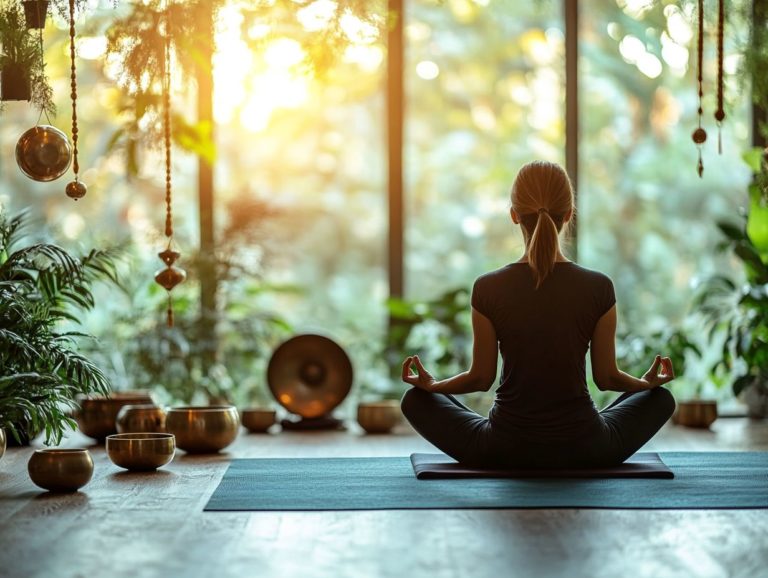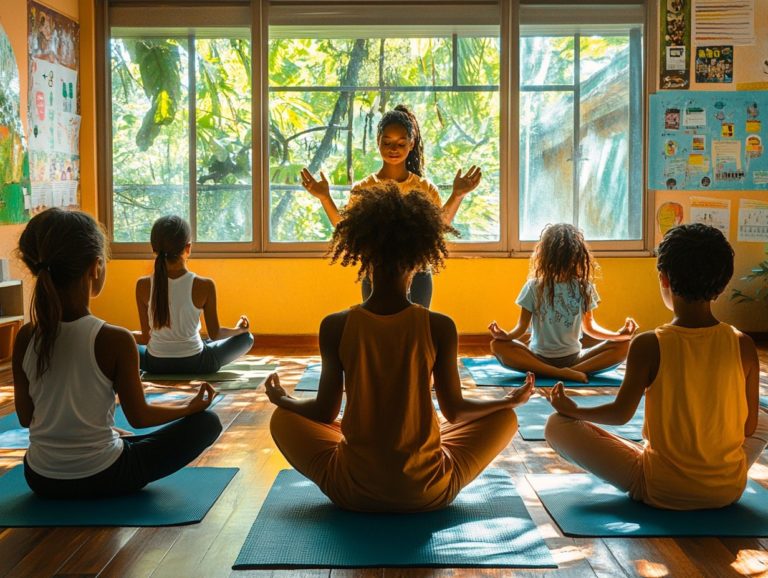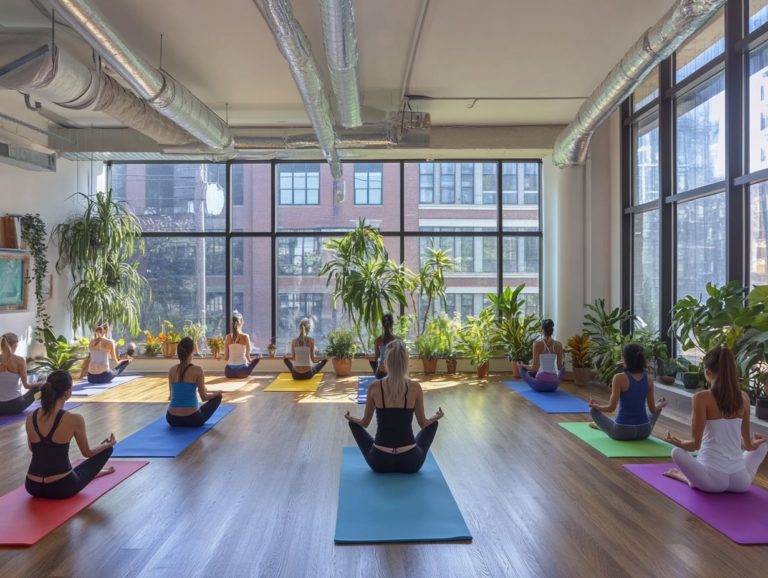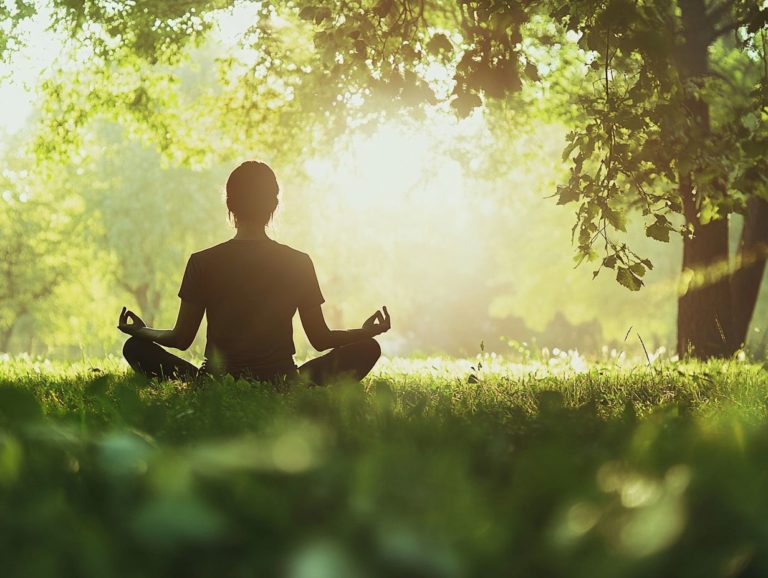Mindfulness Meditation: Techniques and Benefits
Mindfulness meditation is a transformative practice that invites you to connect with the present moment, cultivating a sense of calm and awareness amidst the chaos of daily life.
Let s explore the essence of mindfulness meditation, highlighting essential techniques such as breathing exercises, body scans, and the distinct experience of walking meditation.
It addresses many health benefits for your body and mind, along with practical tips for seamlessly integrating mindfulness into your everyday routine.
Whether you’re just starting out or seeking to enrich your practice, this guide empowers you to harness the profound transformative power of mindfulness.
Contents
- Key Takeaways:
- Understanding Mindfulness Meditation
- Techniques for Practicing Mindfulness Meditation
- Benefits of Mindfulness Meditation
- Incorporating Mindfulness Meditation into Daily Life
- Frequently Asked Questions
- What is mindfulness meditation and how does it differ from traditional meditation?
- What are some common techniques used in mindfulness meditation?
- What are the benefits of practicing mindfulness meditation?
- Do I need any special equipment to practice mindfulness meditation?
- Can mindfulness meditation help with managing emotions?
- How often should I practice mindfulness meditation for optimal results?
Key Takeaways:

Mindfulness meditation is a practice of focusing on the present moment and paying attention to thoughts and surroundings without judgment.
Techniques for mindfulness meditation include breathing exercises, body scan meditation, and walking meditation. Incorporating practices like mindful eating techniques can also help reduce stress, improve focus, and increase feelings of well-being.
The benefits of mindfulness meditation encompass physical advantages such as reduced blood pressure and improved immune function, as well as mental and emotional benefits like reduced anxiety and improved mood.
Understanding Mindfulness Meditation
Understanding mindfulness meditation is vital for you if you’re looking to enhance your emotional well-being and cultivate a more relaxed state of mind. In this practice, you focus your attention on the present moment, nurturing awareness and adopting a non-judgmental stance toward your thoughts and feelings.
The benefits can be profound. You may experience stress reduction, improved mental clarity, and a greater sense of inner peace. Many healthcare professionals advocate mindfulness meditation as a powerful tool for managing anxiety and boosting overall mental health.
By incorporating various techniques, you can create a fulfilling meditation practice that fosters personal growth and emotional balance.
What is Mindfulness Meditation?
Mindfulness meditation is a powerful mental practice that invites you to focus your attention and cultivate awareness of the present moment. This allows you to develop a calm mind and enhance your self-awareness.
In this practice, you re encouraged to acknowledge your thoughts and feelings without judgment, creating a valuable space for self-reflection and emotional regulation. It incorporates various techniques like breath awareness, body scanning, and simply sitting in silence, all designed to anchor your thoughts in the here and now.
Unlike other forms of meditation that chase transcendence or specific visualizations, mindfulness meditation fosters a grounded presence, helping you accept your emotions and experiences as they arise.
By nurturing an attitude of curiosity and compassion, you can unlock profound insights into your habitual reactions and thought patterns, enriching your journey of self-discovery.
Techniques for Practicing Mindfulness Meditation
Practicing mindfulness meditation opens the door to a variety of techniques tailored to fit your unique preferences and lifestyle. Whether you gravitate toward breathing exercises, body scanning, or even walking meditation, each method offers distinct pathways to cultivate inner calm and emotional balance.
Breathing Exercises
Breathing exercises are essential elements of mindfulness meditation, helping you cultivate focused attention and achieve a calm mind. These elements ultimately reduce stress and promote relaxation.
One particularly effective technique is diaphragmatic breathing, also known as belly breathing, which encourages you to engage your diaphragm fully for deeper inhalation and exhalation. This method increases oxygen flow throughout your body and fosters a profound sense of grounding and presence.
Breath focus techniques help you center your awareness on your breath, effectively quieting the mental chatter that often accompanies daily life. By integrating these exercises into your meditation practice, you can elevate your overall experience, leading to deeper states of tranquility and emotional clarity that support your journey toward mindful living.
Begin your journey to a calmer mind today!
Body Scan Meditation

Body scan meditation is a transformative practice that invites you to focus on different parts of your body. This fosters relaxation and boosts your emotional well-being.
Start by finding a comfortable position, either lying down or sitting. Then, shift your focus from the top of your head to your toes.
Each area receives your gentle acknowledgment without judgment. This facilitates emotional release and reduces stress.
As you become attuned to various sensations, you may uncover insights that enhance your self-awareness.
Regularly engaging in body scan meditation can boost your emotional resilience and improve your mental health. You ll enjoy a profound sense of peace and balance in your daily life.
Walking Meditation
Walking meditation is a unique form of mindfulness practice that combines walking with focused awareness. This allows you to cultivate self-awareness and emotional balance.
You can easily incorporate walking meditation into your daily routine by taking a mindful stroll in a local park or enjoying a quiet moment during a work break.
Direct your attention to the rhythm of each step. This practice makes mindfulness accessible, especially if sitting still feels challenging.
The benefits of walking meditation are amazing! You ll experience enhanced grounding, improved circulation, and reduced stress levels often surpassing those of traditional sitting meditation.
Participants frequently share that they feel a stronger connection to nature. They transform ordinary moments into valuable opportunities for reflection and awareness.
Benefits of Mindfulness Meditation
Mindfulness meditation offers a wealth of benefits, from improving physical health to enhancing emotional well-being. It provides effective stress reduction techniques that can elevate your quality of life.
Physical Benefits
The physical benefits of mindfulness meditation are truly remarkable. You can experience improved health and effective stress reduction, leading to a lower risk of heart disease.
By weaving mindfulness into your daily routine, you can enhance your resting heart rate and immune function. Relaxation techniques reduce stress hormones, improving your heart health over time.
This practice supports your heart and strengthens your immune system, making it more resilient against illnesses.
As you engage with mindfulness, you may discover a pathway to better physical health, increased energy, and enhanced vitality.
Mental and Emotional Benefits
Mindfulness meditation plays a crucial role in improving your mental and emotional health. It equips you with valuable tools for managing anxiety and achieving emotional balance.
This practice encourages present-focused awareness, fostering resilience and a deeper understanding of your emotions.
You may notice an increase in self-awareness, heightened empathy, and a greater ability to connect with others.
By adopting an open and non-judgmental approach to your thoughts and feelings, mindfulness creates an environment for better emotional regulation. This helps you navigate life s challenges with grace.
The emotional intelligence gained from these practices can significantly enrich your relationships and enhance your mental well-being.
Start your mindfulness journey today and experience the benefits for yourself!
Incorporating Mindfulness Meditation into Daily Life

Incorporating mindfulness meditation into your daily routine is vital for establishing a consistent practice. It helps you feel more balanced and fosters personal growth.
This structured approach sharpens your meditation skills. It also allows you to navigate life with greater ease and clarity.
Tips for Maintaining a Regular Practice
To cultivate a regular mindfulness meditation practice, you can embrace practical strategies like setting reminders. Designing a dedicated space that invites tranquility can also be helpful.
Choosing a consistent time of day for your meditation elevates this practice into a cherished daily ritual. Whether you prefer the serene stillness of early morning or the reflective calm of late evening, aligning your meditation with your lifestyle enhances your commitment.
Minimizing distractions in your chosen meditation area perhaps by using comfortable cushions or incorporating calming visuals will help create a serene environment. This is conducive to mindfulness.
You can also use guided sessions or meditation apps to enrich your experience. This ensures that your practice remains engaging and rewarding over time.
With patience and consistency, you can effortlessly develop a fulfilling meditation habit that enhances your well-being.
Practical Applications in Daily Life
You can easily make mindfulness meditation a part of your daily life through various practical applications. These elevate your emotional well-being, enhance self-awareness, and even spark creativity.
By integrating mindful moments into your everyday tasks, you can transform routine activities into profound experiences of presence. For example, during meals, taking the time to savor each bite enriches the sensory experience while fostering gratitude for the nourishment you receive.
While commuting, you have the opportunity to practice mindfulness by concentrating on your breath or tuning into the sensations of movement. This helps you steer clear of the stress that traffic often brings.
These simple yet powerful practices deepen your understanding of your thoughts and emotions. Ultimately, they guide you toward a happier, more balanced life.
Frequently Asked Questions
Here are some common questions about mindfulness meditation to help you get started.
What is mindfulness meditation and how does it differ from traditional meditation?
Mindfulness meditation is a technique that focuses on bringing your attention to the present moment, without judgment or distraction. It differs from traditional meditation in that it specifically emphasizes awareness and acceptance of your thoughts and feelings as they arise, rather than trying to clear the mind completely.
What are some common techniques used in mindfulness meditation?

Common techniques used in mindfulness meditation include focusing on the breath, body scan meditations, and guided meditations that focus on specific thoughts or emotions. Walking meditation and loving-kindness meditation are also popular techniques.
What are the benefits of practicing mindfulness meditation?
There are numerous benefits of mindfulness meditation, including reduced stress and anxiety, improved focus and concentration, increased self-awareness, and a greater sense of overall well-being. It has also been shown to lower blood pressure and improve sleep quality.
Do I need any special equipment to practice mindfulness meditation?
No, you do not need any special equipment to practice mindfulness meditation. Some people find it helpful to have a comfortable cushion or mat to sit on. Others may choose to use background music or a guided meditation app. Ultimately, all you need is a quiet space and willingness to focus on the present moment.
Can mindfulness meditation help with managing emotions?
Yes, mindfulness meditation can be a useful tool for managing emotions. By becoming more aware of your thoughts and feelings, you can learn to observe and accept them without judgment. This can lead to a calmer and more balanced emotional state, especially for those struggling with anxiety, depression, or other emotional challenges.
In conclusion, start your mindfulness journey today. You have the tools and insights to make mindfulness a meaningful part of your life!
How often should I practice mindfulness meditation for optimal results?
There is no set rule for how often to practice mindfulness meditation. Some people find it beneficial to do it daily, while others may only practice a few times a week.
Find a routine that suits your lifestyle. Consistency is key.
Even a few minutes a day can lead to positive effects on your well-being. Don t wait to feel better! Start practicing mindfulness meditation today.






